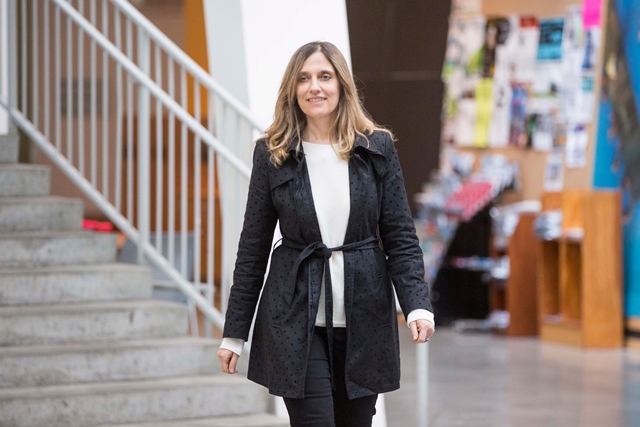
Prof. Regina Barzilay is one of 24 MacArthur Foundation Fellows for 2017. The MacArthur grants of $625,000 over five years are commonly known as the “genius grants."
“It brings great honor to Ben-Gurion University of the Negev when one of our graduates becomes a MacArthur Foundation Fellow,” says BGU President Prof. Rivka Carmi, “Prof. Barzilay’s focus on machine learning and its real world applications to a variety of fields, including the medical field, perfectly exemplify BGU’s current strengths.”
“It is particularly gratifying to me that a woman researcher has won such a prestigious award as one of my priorities as president for the last 11 years has been women’s place in academia. We wish Prof. Barzilay continued good health and fruitful research for the benefit of mankind for many years to come,” she adds.
From the MacArthur Foundation website:
Barzilay received B.A. (1993) and M.S. (1998) degrees from BGU and a Ph.D. (2003) from Columbia University. She has been affiliated with the Massachusetts Institute of Technology since 2003 and is currently Delta Electronics Professor of Electrical Engineering and Computer Science. She is a computational linguist developing machine learning methods that enable computers to interpret unstructured document content and perform real-world tasks with the promise for significant societal impact.
Barzilay has made significant contributions to a wide range of problems in computational linguistics, including both interpretation and generation of human language. Much of her work is focused on designing machine learning models that do not require large amounts of annotations for training since such resources are not available for most languages and tasks. In the multilingual context, Barzilay created algorithms that leverage annotations from high-resource languages (i.e., such as English) to analyze languages that lack such annotations; this includes the vast majority of world languages. For example, she and a student deciphered the ancient semitic language Ugaritic by mapping cognates and related morphological structures onto the related Hebrew language. This work not only democratizes natural language processing (NLP) by extending its potential benefits to a wider range of languages, it also yields insights for theories of language universals. Jointly with her students, Barzilay also pioneered the development of reinforcement learning methods for language grounding—that is, mapping language to entities and actions in the world. Through a feedback loop, the program learns in an unsupervised, coordinated way, allowing it to interact with the environment based on its understanding, continuously refine its semantic model, and turn the instructions into executable actions. This technique has been demonstrated to work with a high degree of accuracy in tasks such as configuring computer software using text manuals and in improving computer performance in the strategy game Civilization.
Currently, Barzilay is focused on bringing the power of machine learning to oncology. In collaboration with physicians and her students, she is devising deep learning models that utilize imaging, free text, and structured data to identify trends that affect early diagnosis, treatment, and disease prevention. Barzilay is poised to play a leading role in creating new models that advance the capacity of computers to harness the power of human language data.
Her scientific papers have appeared in such journals as Computational Linguistics, Transactions of the Association for Computational Linguistics, and Journal of Artificial Intelligence Research and in conference proceedings of the Association for Computational Linguistics (ACL) and Empirical Methods for Natural Language Processing (EMNLP).
The MacArthur Fellowship is a $625,000, no-strings-attached award to extraordinarily talented and creative individuals as an investment in their potential. The Foundation has been awarding the grants since 1981.
There are three criteria for selection of Fellows:
- Exceptional creativity
- Promise for important future advances based on a track record of significant accomplishments
- Potential for the Fellowship to facilitate subsequent creative work
The MacArthur Fellows Program is intended to encourage people of outstanding talent to pursue their own creative, intellectual, and professional inclinations. In keeping with this purpose, the Foundation awards fellowships directly to individuals rather than through institutions. Recipients may be writers, scientists, artists, social scientists, humanists, teachers, entrepreneurs, or those in other fields, with or without institutional affiliations. They may use their fellowship to advance their expertise, engage in bold new work, or, if they wish, to change fields or alter the direction of their careers.
Although nominees are reviewed for their achievements, the fellowship is not a lifetime achievement award, but rather an investment in a person's originality, insight, and potential. Indeed, the purpose of the MacArthur Fellows Program is to enable recipients to exercise their own creative instincts for the benefit of human society.
The Foundation does not require or expect specific products or reports from MacArthur Fellows and does not evaluate recipients' creativity during the term of the fellowship. The MacArthur Fellowship is a "no strings attached" award in support of people, not projects. Each fellowship comes with a stipend of $625,000 to the recipient, paid out in equal quarterly installments over five years.
